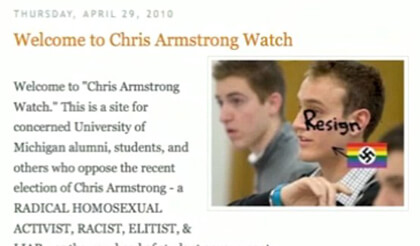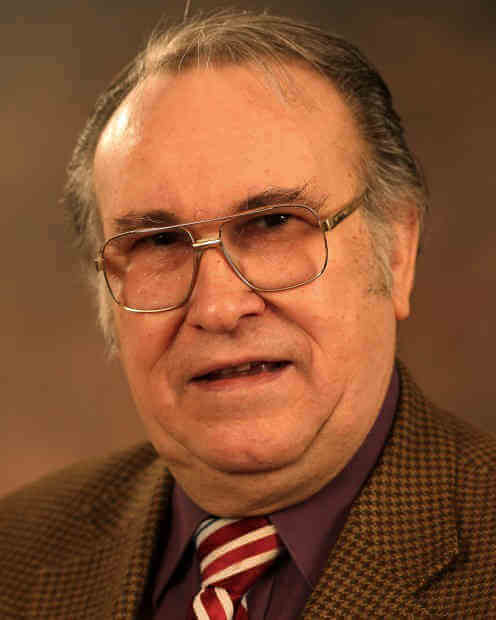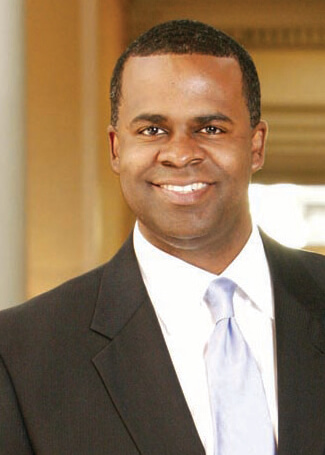While an assistant attorney general for the State of Michigan, Andrew Shirvell took aim at Chris Armstrong, then a gay student leader at the University of Michigan.
Andrew Shirvell, a former Michigan assistant attorney general discharged for his harassment of an openly gay student leader at the University of Michigan, suffered a double loss in that state’s Court of Appeals on January 8. The court upheld the state’s denial of his discharge grievance, finding his conduct unprotected by the First Amendment, and also ruled he was not eligible for unemployment benefits.
In 2010, Chris Armstrong was elected the first out gay president of the University of Michigan Student Assembly. Shirvell, a Michigan alum who served as assistant attorney general beginning in 2007, was outraged and set up a public blog, “Chris Armstrong Watch,” dedicated to maligning Armstrong for his “radical homosexual agenda.”
Judge Stephen Borello’s opinion for the court noted that Shirvell called Armstrong a “radical homosexual activist, racist, elitist, and a liar” and a “privileged pervert” with a “deranged personality” who had hosted a “gay orgy.” One online page “contained a rainbow flag with a swastika posted next to a photograph of Armstrong’s face with the word ‘resign’ nearby.”
Appeals panel rejects claim Andrew Shirvell’s obsessive anti-gay campaign was private, protected free speech
During one TV interview, Borello noted, Shirvell “did not deny that on one occasion he referred to Armstrong on Facebook as ‘Satan’s representative’ on the student assembly.” Shirvell also “appeared outside Armstrong’s residence and at events where Armstrong was present and held protest signs,” according to the court’s opinion. Shirvell took his campaign against Armstrong onto Anderson Cooper’s CNN show as well as Jon Stewart’s Comedy Central “Daily Show,” where he said he was speaking as a private citizen and not in his official capacity.
Still, pressure mounted on then-Attorney General Michael Cox, himself a conservative Republican, to do something. Cox’s initial public response was to defend Shirvell’s First Amendment right to express his views. As pressure built, however, the attorney general had enough, finally terminating Shirvell for “conduct unbecoming a state employee” — behavior that “could reasonably be construed to be an invasion of privacy, slanderous, libelous, and tantamount to stalking behavior unbecoming an assistant attorney general.”
When Shirvell complained to the Michigan Civil Service Commission, it found Cox had just cause to terminate him. The state Unemployment Insurance Agency, meanwhile, found he did not qualify for unemployment benefits. The discharge was upheld by one court, while the unemployment ruling was reversed by another. The Court of Appeals ruled against Shirvell on both counts.
The Supreme Court has ruled that a public employee might lose First Amendment protections if their speech “impaired discipline by superiors, detrimentally impacted close working relationships, undermined a legitimate goal or mission of the employer, impeded the performance of the speaker’s duties, and impaired harmony among co-workers.”
The state, Judge Borello wrote, “introduced evidence to show that its interests in the effective provision of governmental services outweighed Shirvell’s speech interests.” The “media firestorm” Shirvell created soon turned in to “a public-relations crisis” for the attorney general’s office, with “dedicated resources” employed to respond and Cox having to take time to appear on national media to discuss the controversy. Recruiting “the most qualified employment candidates” and maintaining “close working relationships and harmony among co-workers” could also be impaired, the court found.
The court also noted that “the attorney general serves all of the citizens of Michigan, irrespective of race, creed, religion, gender, or sexual orientation. Thus, the Department had a real and substantial interest in maintaining neutrality and conducting its operations in a non-biased manner; the public actions of its employees, therefore, were critical in protecting this interest.” Borello wrote, “Shirvell’s public ‘campaign’ against Armstrong undermined” the interests of the attorney general’s office by casting “a cloud over both his and the Department’s ability to maintain the public trust and severely tarnished the Department’s reputation.”




































